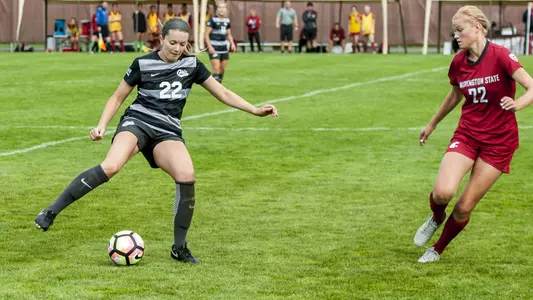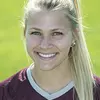
Janessa Fowler is ... D) All of the above
9/6/2018 9:33:00 PM | Soccer
At about 4:30 p.m. on Friday, at the Madrid Sports Complex on the campus of the University of Wyoming in Laramie, a spectator will probably look around and start wondering what they could have missed. What, exactly, was happening?
Why does the senior midfielder for Montana, checking into the match for the first time, have tears streaming down her face? And why does she have a smile -- the type usually reserved for a game-winning goal -- as well? How could someone be a font of such dueling emotions?
The spectator will keep scanning. There, in the stands, is a pack of fans who made the drive up from the Denver area. They're crying too. Out of fear. Out of thankfulness. Out of worry. Out of love and support and seeing someone they care about being who she is once again, a soccer player in full.
The other seniors, who arrived with her in the fall of 2015 -- eight to start with, just four of them left standing and competing -- will have their own emotions, but they will all be out on the field, playing the sport that was taken away from Janessa Fowler four months ago.
Most of the players on the bench will be too early in their collegiate careers to fully understand the weight of the moment, their senior years, when everything comes with a countdown clock, when moments become memories that will be retained for a lifetime, still too far off in the distance.
But the one standing at the very end of the team bench will get it, the one who is with the players when they are at their most vulnerable, at their lowest possible point, when they've been injured and are not able to do the one thing that's defined them for so much of their lives. When they can't play.
Krista Allen? She'll have tears in her eyes as well. "Probably," says the team's athletic trainer. Then she'll remember the journey she has shepherded Fowler on, through the dark days, to ones that had a glimmer of hope, to this week, when Fowler has been cleared to resume playing. "Okay, definitely."
If you didn't know Janessa Fowler or that she'd had three previous concussions or the destruction that would come from the play, it's the type of video clip that would have gone viral, of a miskicked soccer ball hitting another player in the face. And you would have laughed and moved on with your day.
But what happened in that briefest of moments, at the soccer program's alumni game in late April, when a ball connected with Fowler's head and sent her brain once again caroming off her cranium, was no joke, especially to someone who immediately recognized what had just happened and what it meant.
"The way I got hit, I knew instantly," says Fowler. "My head hurt, but I wasn't thinking so much about my head hurting. I kept thinking: I can't be out again, I can't be out again."
She had suffered concussions twice in high school, but those were relatively easy to recover from, as the first ones usually are for an injury that becomes more ruinous the more it happens, which it did again to Fowler in the spring of her freshman year at Montana, making it three.
What had lasted mere days when she had her first concussions -- the headaches, the dizziness, the nausea -- was now being drawn out. She knew it would be even worse if it happened again. And it was, as she tried to finish out the school year in early May with No. 4.
There was the studying as the semester came to a close. The stress of finals. "That's why I thought it was so bad," she says, "but we got out of school and it didn't get any better."
She returned to Colorado and spent the rest of May in a fog. The headaches were there every day, as was the nausea, and the vibrant, young athlete, who had just spent the school year training and playing and studying and going to class, was told to do none of it.
"Krista got me hooked up with a vestibular rehab specialist back home, and she was working to try to alleviate some of my symptoms," says Fowler, who was told she couldn't read or watch TV. Even rides in the car would become nearly unbearable.
"You go from lifting in the morning and practicing in the afternoon and going to class in between, and you can't do anything like that. I was told to do the complete opposite. It's hard to go from doing so much to doing so little."
So she was still. A body that had been conditioned to be in nearly constant movement was shut down, which left the mind to wander. And that may have been even worse than the inactivity.
Her teammates were soon going to be starting their summer workouts in preparation for the season ahead under a new coach. She wasn't. And the symptoms were unrelenting. Time was passing, but nothing was changing.
She went from feeling like she was falling behind to wondering if she would ever be able to put on cleats and kick a soccer ball again to wondering if she would ever feel normal again. As May rolled on, she forgot what normal even felt like.
She'd had difficulties in life before, most notably her parents' divorce, and the one thing she most certainly could not do -- play soccer -- is what had been her source of therapy through the worst of times, her way of dealing with the difficulties in her life. Now she didn't even have that.
She was in Denver, separated from the program and her teammates, but she was hardly alone. She had her parents and family at her side. The new coaching staff reached out. Allen was in constant communication, as were her teammates.
"Having that many people rallying around me was super exciting," she says. "Anytime my confidence wavered, someone filled it in for me."
Finally, some improvement. She went her first day without any symptoms and had the same thought any Division I athlete would: I need to catch up on lost time. I need to start training again. My senior year is fast approaching, and there is work to be done.
But even the most basic attempt to get back on her feet and move like normal would have her waking up the next morning feeling like she had gone back to square one. The headaches would return. So would the nausea. And so would the discouragement.
"In my head, I set dates. Okay, this is the date I need to be running by to be prepared for the season. Then those dates would come and go," she says.
"I'll own up to it that I broke down multiple times. This can't be happening. I really questioned what the purpose of all this was. Are my days of playing supposed to be done?"
In early July the editors at Top Drawer Soccer named Janessa Fowler the best player in the Big Sky Conference for 2018. That was announced at about the same time Fowler was able to ride a stationary bike for 20 minutes at a time, every other day. The start of the season was now less than a month away.
Allen has experience with broken bones, with ACL tears, with a wide assortment of other injuries, and most of them are textbook in their rehabilitation and recovery. When a player does this, the trainer does this, this and this for this amount of time, and all should be back to normal.
Concussions are different, unique, especially as they grow in number. There is no established or set protocol for a fourth concussion, which made things even harder, because neither trainer nor athlete knew what to expect from day to day.
On days when Fowler felt good, Allen had to be the voice of reason and keep her from doing too much. On days when Fowler regressed, Allen had to be cheerleader. That is why the feeling of investment is so deep and why Allen will be so anxious on Friday in Laramie.
"Not only has it been an emotional rollercoaster for her, it has been for me as well," she says. "I've gone through the struggles with her. There were days when I questioned if she'd ever be back. And there were days that I needed to push her and convince her that she was going to be okay.
"It becomes more of an emotional investment than your typical rehab because nothing's laid out for you. It's trial and error."
Fowler is playing on Friday, so you already know that it's been a success story, but for every personal step forward on the path toward healing, like running sprints up and down the sideline while being held out of contact sessions, the team was on another path, one in full view.
She would be excited about the progress she had made, then look over and see practice taking place and realize how far away she still was. "It was my senior season. I wanted to reach out and grab it, but there was always this fear of doing too much and having a setback," she says.
The first week of preseason practice was tough, she admits. She was there every day, part of the team but not quite part of the team. "Everybody was out there playing, and I was doing some running on the side. But I tried to stay upbeat, because I was going days without symptoms," she says.
"The first weekend of games was probably the hardest part of the entire injury. We're at home and all of the seniors are starting except for me. I was excited for them, that they were having a moment. I didn't feel like I was a part of it, and it was hard, but that was the reality."
A week later she was on the sideline in Tempe, Ariz., when Ellie Otteson, who came into the program with Fowler back in 2015, scored against Arizona State to tie the game midway through the first half. And there were those tears again.
"I was crying tears of joy because I was so excited for her," says Fowler. "But I wanted to be on the field and in that moment with her. It's made me hungry to be out there."
Which brings up the critical question: If Janessa Fowler is feeling so good, and if she can so easily recall what those days in May were like, with their feeling of utter hopelessness, why would she risk her health one more time? What might a fifth concussion do to her?
Because no one who's had four concussions is ever really healed. All they can do is their best to avoid another one. That will be part of the reason for the tears in the stands on Friday, as Fowler's extended family supports her while also praying that she can stay out of harm's way.
"My mentality from the start has been that I can't be done. It was more, I'm going to play, so at what point am I going to play?" she says. "That time is now, and it's hard to put into words, especially to my parents, who are like, 'Are you sure? We're so fearful for you.' "
It's a tough way to watch a soccer match. Fowler's parents want to see their daughter playing the sport she loves again. But at what possible price? Because soccer isn't scripted. She can avoid midfield headers and stay clear of the box on corner kicks, but trouble is always only one miskick away.
What's driving her is more than soccer, of course. Those moments she missed, at preseason practice, during the opening weekend of matches, at Arizona State? They weren't necessarily about soccer. It was just the sport that brought those moments to life. And she's not going to miss out on any more.
It's that clock again, the athlete's clock, growing ever and ever louder, and it's marching toward zero now. She may be further and further from her concussion but she's getting closer and closer to the end. And that's what's pushing her.
You'll notice she doesn't talk directly about wins and losses. Or winning a Big Sky championship. She talks about moments that are shared together, whether those are on the field or off. Sure, a championship would create a boatload, but this feels bigger than that.
"You don't realize the bonds you form and the moments you get to share together," she says. "And the moments we have left have become much more selective. I want to enjoy every moment with these girls that I can."
The class started with eight in the fall of 2015. One returned to Canada after that first season, the others had to medically retire for various reasons. All that's left are Fowler, Otteson, Taryn Miller and McKenzie Warren.
In their four years they've been part of a program that has brought on a new athletic trainer, a new strength and conditioning coach, and a new head coach. That type of turnover tends to bond those who are going through those changes even tighter. Amid all the turnover, they were each other's constant.
"There has been so much adversity I've faced with these girls, and we've all taken it in stride," said Fowler. "We've seen so much together. Now it's about enjoying the moments I have left with girls who have become like family."
And that's why, when new coach Chris Citowicki signals on Friday afternoon for Fowler to enter the match, that spectator, who will be unaware of Fowler's story, will see a player both smiling and with tears in her eyes as she runs onto the field. And they'll wonder what, exactly, is going on.
She'll be nervous, excited, worried, joy-filled, but above all full of gratitude. Sure, there will be risk, but that is part of the deal for every athlete. Ask Hallie Widner or Catie Buck or Raye Burton or Kendall Furrow. All of them started the season. None of them are playing now, their opportunity stolen away.
All of it has combined to give Fowler a new perspective, because no one knows when the last match is going to come. Janessa Fowler just knows she has been gifted another chance to play the sport she loves with teammates who have become like family. She will not be swayed by fear of what might happen.
She's been given full clearance, but don't expect her to be the player she was. At least not right away. She'll have to play her way back to that level. But what separates her from the other holding midfielders in the Big Sky is her knowledge, her vision, her anticipation. That never left, and it will see her through.
She'll take what she can get this weekend and moving forward, and embrace it with a new attitude of appreciation, because it wasn't that long ago she was worried Friday and the opportunity to play again might never come her way again.
"I just have a different perspective now. I'm trying to soak in every moment I have of these last few weeks, because for a while there I didn't think I was going to have it," she says, seeing clearly now, maybe more than ever, even with the tears. Or maybe because of them.
Why does the senior midfielder for Montana, checking into the match for the first time, have tears streaming down her face? And why does she have a smile -- the type usually reserved for a game-winning goal -- as well? How could someone be a font of such dueling emotions?
The spectator will keep scanning. There, in the stands, is a pack of fans who made the drive up from the Denver area. They're crying too. Out of fear. Out of thankfulness. Out of worry. Out of love and support and seeing someone they care about being who she is once again, a soccer player in full.
The other seniors, who arrived with her in the fall of 2015 -- eight to start with, just four of them left standing and competing -- will have their own emotions, but they will all be out on the field, playing the sport that was taken away from Janessa Fowler four months ago.
Most of the players on the bench will be too early in their collegiate careers to fully understand the weight of the moment, their senior years, when everything comes with a countdown clock, when moments become memories that will be retained for a lifetime, still too far off in the distance.
But the one standing at the very end of the team bench will get it, the one who is with the players when they are at their most vulnerable, at their lowest possible point, when they've been injured and are not able to do the one thing that's defined them for so much of their lives. When they can't play.
Krista Allen? She'll have tears in her eyes as well. "Probably," says the team's athletic trainer. Then she'll remember the journey she has shepherded Fowler on, through the dark days, to ones that had a glimmer of hope, to this week, when Fowler has been cleared to resume playing. "Okay, definitely."
If you didn't know Janessa Fowler or that she'd had three previous concussions or the destruction that would come from the play, it's the type of video clip that would have gone viral, of a miskicked soccer ball hitting another player in the face. And you would have laughed and moved on with your day.
But what happened in that briefest of moments, at the soccer program's alumni game in late April, when a ball connected with Fowler's head and sent her brain once again caroming off her cranium, was no joke, especially to someone who immediately recognized what had just happened and what it meant.
"The way I got hit, I knew instantly," says Fowler. "My head hurt, but I wasn't thinking so much about my head hurting. I kept thinking: I can't be out again, I can't be out again."
She had suffered concussions twice in high school, but those were relatively easy to recover from, as the first ones usually are for an injury that becomes more ruinous the more it happens, which it did again to Fowler in the spring of her freshman year at Montana, making it three.
What had lasted mere days when she had her first concussions -- the headaches, the dizziness, the nausea -- was now being drawn out. She knew it would be even worse if it happened again. And it was, as she tried to finish out the school year in early May with No. 4.
There was the studying as the semester came to a close. The stress of finals. "That's why I thought it was so bad," she says, "but we got out of school and it didn't get any better."
She returned to Colorado and spent the rest of May in a fog. The headaches were there every day, as was the nausea, and the vibrant, young athlete, who had just spent the school year training and playing and studying and going to class, was told to do none of it.
"Krista got me hooked up with a vestibular rehab specialist back home, and she was working to try to alleviate some of my symptoms," says Fowler, who was told she couldn't read or watch TV. Even rides in the car would become nearly unbearable.
"You go from lifting in the morning and practicing in the afternoon and going to class in between, and you can't do anything like that. I was told to do the complete opposite. It's hard to go from doing so much to doing so little."
So she was still. A body that had been conditioned to be in nearly constant movement was shut down, which left the mind to wander. And that may have been even worse than the inactivity.
Her teammates were soon going to be starting their summer workouts in preparation for the season ahead under a new coach. She wasn't. And the symptoms were unrelenting. Time was passing, but nothing was changing.
She went from feeling like she was falling behind to wondering if she would ever be able to put on cleats and kick a soccer ball again to wondering if she would ever feel normal again. As May rolled on, she forgot what normal even felt like.
She'd had difficulties in life before, most notably her parents' divorce, and the one thing she most certainly could not do -- play soccer -- is what had been her source of therapy through the worst of times, her way of dealing with the difficulties in her life. Now she didn't even have that.
She was in Denver, separated from the program and her teammates, but she was hardly alone. She had her parents and family at her side. The new coaching staff reached out. Allen was in constant communication, as were her teammates.
"Having that many people rallying around me was super exciting," she says. "Anytime my confidence wavered, someone filled it in for me."
Finally, some improvement. She went her first day without any symptoms and had the same thought any Division I athlete would: I need to catch up on lost time. I need to start training again. My senior year is fast approaching, and there is work to be done.
But even the most basic attempt to get back on her feet and move like normal would have her waking up the next morning feeling like she had gone back to square one. The headaches would return. So would the nausea. And so would the discouragement.
"In my head, I set dates. Okay, this is the date I need to be running by to be prepared for the season. Then those dates would come and go," she says.
"I'll own up to it that I broke down multiple times. This can't be happening. I really questioned what the purpose of all this was. Are my days of playing supposed to be done?"
In early July the editors at Top Drawer Soccer named Janessa Fowler the best player in the Big Sky Conference for 2018. That was announced at about the same time Fowler was able to ride a stationary bike for 20 minutes at a time, every other day. The start of the season was now less than a month away.
Allen has experience with broken bones, with ACL tears, with a wide assortment of other injuries, and most of them are textbook in their rehabilitation and recovery. When a player does this, the trainer does this, this and this for this amount of time, and all should be back to normal.
Concussions are different, unique, especially as they grow in number. There is no established or set protocol for a fourth concussion, which made things even harder, because neither trainer nor athlete knew what to expect from day to day.
On days when Fowler felt good, Allen had to be the voice of reason and keep her from doing too much. On days when Fowler regressed, Allen had to be cheerleader. That is why the feeling of investment is so deep and why Allen will be so anxious on Friday in Laramie.
"Not only has it been an emotional rollercoaster for her, it has been for me as well," she says. "I've gone through the struggles with her. There were days when I questioned if she'd ever be back. And there were days that I needed to push her and convince her that she was going to be okay.
"It becomes more of an emotional investment than your typical rehab because nothing's laid out for you. It's trial and error."
Fowler is playing on Friday, so you already know that it's been a success story, but for every personal step forward on the path toward healing, like running sprints up and down the sideline while being held out of contact sessions, the team was on another path, one in full view.
She would be excited about the progress she had made, then look over and see practice taking place and realize how far away she still was. "It was my senior season. I wanted to reach out and grab it, but there was always this fear of doing too much and having a setback," she says.
The first week of preseason practice was tough, she admits. She was there every day, part of the team but not quite part of the team. "Everybody was out there playing, and I was doing some running on the side. But I tried to stay upbeat, because I was going days without symptoms," she says.
"The first weekend of games was probably the hardest part of the entire injury. We're at home and all of the seniors are starting except for me. I was excited for them, that they were having a moment. I didn't feel like I was a part of it, and it was hard, but that was the reality."
A week later she was on the sideline in Tempe, Ariz., when Ellie Otteson, who came into the program with Fowler back in 2015, scored against Arizona State to tie the game midway through the first half. And there were those tears again.
"I was crying tears of joy because I was so excited for her," says Fowler. "But I wanted to be on the field and in that moment with her. It's made me hungry to be out there."
Which brings up the critical question: If Janessa Fowler is feeling so good, and if she can so easily recall what those days in May were like, with their feeling of utter hopelessness, why would she risk her health one more time? What might a fifth concussion do to her?
Because no one who's had four concussions is ever really healed. All they can do is their best to avoid another one. That will be part of the reason for the tears in the stands on Friday, as Fowler's extended family supports her while also praying that she can stay out of harm's way.
"My mentality from the start has been that I can't be done. It was more, I'm going to play, so at what point am I going to play?" she says. "That time is now, and it's hard to put into words, especially to my parents, who are like, 'Are you sure? We're so fearful for you.' "
It's a tough way to watch a soccer match. Fowler's parents want to see their daughter playing the sport she loves again. But at what possible price? Because soccer isn't scripted. She can avoid midfield headers and stay clear of the box on corner kicks, but trouble is always only one miskick away.
What's driving her is more than soccer, of course. Those moments she missed, at preseason practice, during the opening weekend of matches, at Arizona State? They weren't necessarily about soccer. It was just the sport that brought those moments to life. And she's not going to miss out on any more.
It's that clock again, the athlete's clock, growing ever and ever louder, and it's marching toward zero now. She may be further and further from her concussion but she's getting closer and closer to the end. And that's what's pushing her.
You'll notice she doesn't talk directly about wins and losses. Or winning a Big Sky championship. She talks about moments that are shared together, whether those are on the field or off. Sure, a championship would create a boatload, but this feels bigger than that.
"You don't realize the bonds you form and the moments you get to share together," she says. "And the moments we have left have become much more selective. I want to enjoy every moment with these girls that I can."
The class started with eight in the fall of 2015. One returned to Canada after that first season, the others had to medically retire for various reasons. All that's left are Fowler, Otteson, Taryn Miller and McKenzie Warren.
In their four years they've been part of a program that has brought on a new athletic trainer, a new strength and conditioning coach, and a new head coach. That type of turnover tends to bond those who are going through those changes even tighter. Amid all the turnover, they were each other's constant.
"There has been so much adversity I've faced with these girls, and we've all taken it in stride," said Fowler. "We've seen so much together. Now it's about enjoying the moments I have left with girls who have become like family."
And that's why, when new coach Chris Citowicki signals on Friday afternoon for Fowler to enter the match, that spectator, who will be unaware of Fowler's story, will see a player both smiling and with tears in her eyes as she runs onto the field. And they'll wonder what, exactly, is going on.
She'll be nervous, excited, worried, joy-filled, but above all full of gratitude. Sure, there will be risk, but that is part of the deal for every athlete. Ask Hallie Widner or Catie Buck or Raye Burton or Kendall Furrow. All of them started the season. None of them are playing now, their opportunity stolen away.
All of it has combined to give Fowler a new perspective, because no one knows when the last match is going to come. Janessa Fowler just knows she has been gifted another chance to play the sport she loves with teammates who have become like family. She will not be swayed by fear of what might happen.
She's been given full clearance, but don't expect her to be the player she was. At least not right away. She'll have to play her way back to that level. But what separates her from the other holding midfielders in the Big Sky is her knowledge, her vision, her anticipation. That never left, and it will see her through.
She'll take what she can get this weekend and moving forward, and embrace it with a new attitude of appreciation, because it wasn't that long ago she was worried Friday and the opportunity to play again might never come her way again.
"I just have a different perspective now. I'm trying to soak in every moment I have of these last few weeks, because for a while there I didn't think I was going to have it," she says, seeing clearly now, maybe more than ever, even with the tears. Or maybe because of them.
Players Mentioned
UM vs SAC Highlights
Sunday, October 26
Griz Volleyball Press Conference - 10/20/25
Monday, October 20
Montana vs Sacred Heart Highlights
Monday, October 20
UM vs SHU Postgame Press Conference
Sunday, October 19















